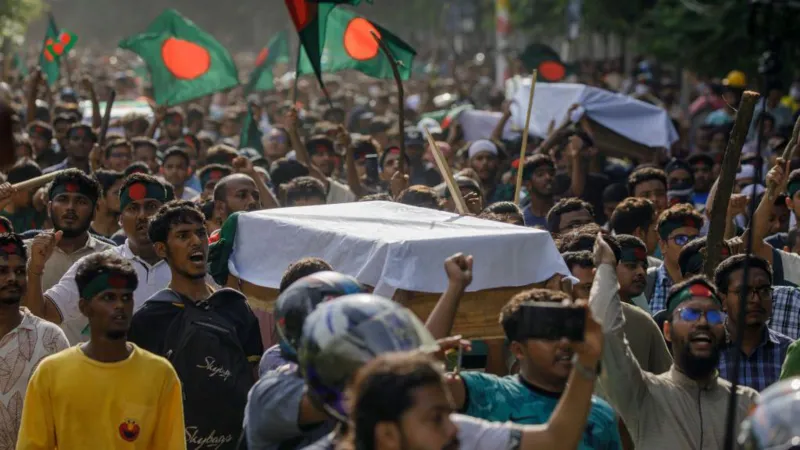
More than 150 people have been killed and 500 arrested in the past two weeks of violence in Bangladesh. Photo: Getty Images
Kelly Ng, Subhajyoti Ghosh & BBC Bangla, Singapore and Dhaka, July 23: Bangladesh's Prime Minister Sheikh Hasina has blamed her political opponents for the deadly unrest in the country, adding she was "forced" to impose a curfew for public safety.
"I never wanted it," she said on Monday in a meeting with business leaders in the capital Dhaka. "We will lift the curfew whenever the situation gets better."
Her comments come a day after Bangladesh's top court scrapped most of the quotas on government jobs, which have sparked weeks of violent clashes across the country.
More than 150 people have been killed in clashes between protesters and the police and the rallies have escalated into calls for Hasina to step down.
Hasina has blamed the main opposition Bangladesh Nationalist Party and the Jamaat-e-Islami and their student wings for the violence, saying her government will work to "suppress these militants and create a better environment".
Political analysts see the unrest as an unprecedented test for one of Asia's most powerful women.
Hasina, 76, secured her fourth straight term as prime minister in January, in a controversial election boycotted by the country's main opposition parties.
"The over-politicisation of the spirit of the liberation war by Sheikh Hasina and her party, the denial of basic voting rights to citizens year after year, and the dictatorial nature of her regime have angered a large section of society," said Mubashar Hasan, a research fellow at the University of Oslo who studies authoritarianism in Asia.
"Unfortunately, she never became the prime minister for everyone in the country. Instead, she remained the leader of just one group," he told BBC Bangla.
Before Sunday's court decision, Bangladesh reserved about 30% of its high-paying government jobs for children of those who fought in Bangladesh's war for independence from Pakistan in 1971.
The court ruled that just 5% of the roles can be reserved for the veterans' relatives.
Hasina is the daughter of Bangladesh's founding leader Sheikh Mujibur Rahman.
Her government abolished the reservation in 2018, following protests. But a court ordered the authorities to reinstate the quotas in June, triggering fresh unrest.
The protests by mostly university students began about two weeks ago. They say the system unfairly benefits the children of pro-government groups and they have called for it to be replaced with merit-based recruitment.
Hasina initially dismissed the protestors' concerns, which analysts say exacerbated the unrest.
On 14 July, she continued to justify the quota system by reinforcing the divide between the descendants of pro-liberation and anti-liberation forces.
“Why do [the protesters] have so much resentment towards the freedom fighters? If the grandchildren of the freedom fighters don’t get quota benefits, should the grandchildren of Razakars get the benefit?” she said at a press conference.
The Razakars - a derogatory label in Bangladesh - refer to a paramilitary force made up of Bangladeshis who fought on the side of Pakistan during the 1971 war. The group is also accused of heinous crimes.
Hasina's comments galvanised even more protesters within hours. Thousands of students took to the streets of Dhaka that night protesting the prime minister's comments.
Over the next few days, many more held rallies across the country. Numerous fires were lit across the country, including at the state broadcaster BTV.
About 500 people have also been arrested in the past two weeks, which saw authorities calling in the military and imposing a nationwide curfew.
The country's mobile internet and text message services have been suspended for at least five days in an attempt to quell the protests.
Some student leaders have vowed to continue protesting to demand justice for protesters killed and detained in recent days, the resignations of government ministers and an apology from Hasina.










